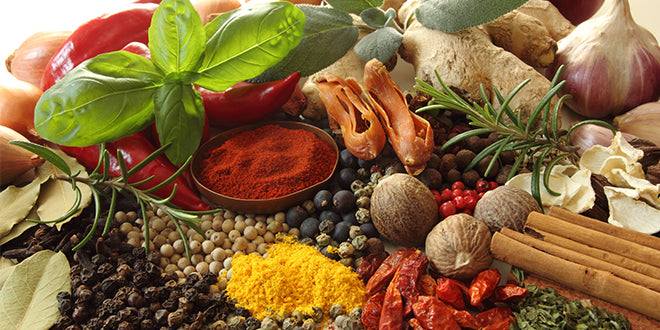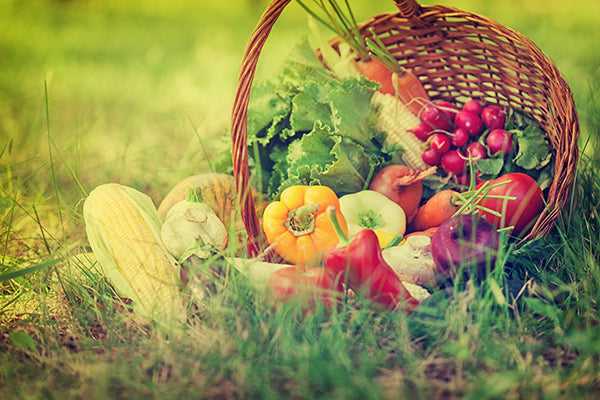Hey, what happened to the seeds and nuts? Recently, we were listening to Dr. Andrew Weil and he referred to his favorite four food groups and we were surprised to learn exactly what they were!
Why would Dr. Andrew Weil recommend herbs and spices instead of seeds and nuts?
Here are few of the many ways to create variety in the spices of life:
Scallions
Parsley
Basil
Cilantro
Oregano
Garlic
Nutritional yeast
Sea vegetables
dill
mint
cayenne
bay leaf
anise
horseradish
nutmeg
saffron
chives
cumin
chili pepper
thyme
coriander
lavender
black pepper
sea salt
rosemary
cardamom
cinnamon
ginger
cloves
lemongrass
vanilla
tarragon
paprika
turmeric
sage
fennel
mustard
wasabi
These whole foods are brimming with anti-inflammatory properties. So, if you are trying to eat foods that will not compromise your health, it makes sense to add herbs and spices to your whole food diet. Culinary herbs have naturally occurring essential oils that are great for digestion.
Another important reason is that they will enhance the flavor of your whole foods so it is likely that someone who may be reluctant to consume nutritious foods will enjoy the full flavor of the food from the herb or spice addition.
Herbs and spices are parts of plants that are used for flavoring or medicine. What's the difference between the two? Herbs are typically the leafy, green portions of a plant. Spices are derived from other parts including seeds, berries, fruits, bark and roots.
Both spices and herbs have a long history of human use. European tribes in what are now Denmark and Germany used garlic mustard seeds to add a spicy kick - and, likely, some medicinal qualities - to cooked game as far back as 4,000 BC.
Today, it's important to note that America is one of the few places on earth that makes a strong distinction between culinary and medicinal uses for herbs and spices. In many cultures, these properties - and the words that describe them - are either identical or quite similar. When Hippocrates exhorted his students to "Let food by thy medicine, and medicine be thy food," he was, to a large extent, handing them a peculiarly Western piece of advice. Some Eastern cultures - especially those of China - never made the distinction in the first place.
If you’re interested in awakening your senses and turning your body on to the health- boosting benefits of culinary herbs and spices, here are some reasons - and ways - to begin:
 When neuralgic pain strikes, or arthritic aches overwhelm, herbs and spices can reduce the pain. Ginger and chili peppers (containing capsaicin) do this by interfering with chemicals that serve as nerve signals. Like some over-the-counter painkillers, some plants also act as natural COX 2 inhibitors, thus reducing pain and inflammation. Adding ginger or turmeric to the diet may be useful for those with minor aches and pains. When tooth or gum pain strikes, clove oil is an effective oral anesthetic, performing just as well as topical benzocaine in studies.
When neuralgic pain strikes, or arthritic aches overwhelm, herbs and spices can reduce the pain. Ginger and chili peppers (containing capsaicin) do this by interfering with chemicals that serve as nerve signals. Like some over-the-counter painkillers, some plants also act as natural COX 2 inhibitors, thus reducing pain and inflammation. Adding ginger or turmeric to the diet may be useful for those with minor aches and pains. When tooth or gum pain strikes, clove oil is an effective oral anesthetic, performing just as well as topical benzocaine in studies.
 The smell and taste of spices start digestive juices flowing, priming the body for the task of breaking down food. But herbs and spices keep working all the way through the digestive tract. Anise and fennel both relieve intestinal gas, and fennel is a centuries-old remedy for colic in infants. Cinnamon has been shown to reduce blood sugar. Researchers are hoping this popular spice will be a weapon against diabetes. Plants in the Allium genus (garlic, onions and leeks) may help protect the body from gastrointestinal cancers. Turmeric, the spice in curry, also appears very promising.
The smell and taste of spices start digestive juices flowing, priming the body for the task of breaking down food. But herbs and spices keep working all the way through the digestive tract. Anise and fennel both relieve intestinal gas, and fennel is a centuries-old remedy for colic in infants. Cinnamon has been shown to reduce blood sugar. Researchers are hoping this popular spice will be a weapon against diabetes. Plants in the Allium genus (garlic, onions and leeks) may help protect the body from gastrointestinal cancers. Turmeric, the spice in curry, also appears very promising.
 Herbs and spices have long been used to help prevent food from spoiling by killing bacteria and other harmful organisms. Studies have shown that a wash of one-percent basil essential oil effectively eliminates bacteria on fruits and vegetables, and is much friendlier than bleach. A pepper grinder may also be an ally in your pursuit of health. Black pepper is not only antibacterial; compounds in the common spice protect DNA as well, making it a possible weapon against cancer.
Herbs and spices have long been used to help prevent food from spoiling by killing bacteria and other harmful organisms. Studies have shown that a wash of one-percent basil essential oil effectively eliminates bacteria on fruits and vegetables, and is much friendlier than bleach. A pepper grinder may also be an ally in your pursuit of health. Black pepper is not only antibacterial; compounds in the common spice protect DNA as well, making it a possible weapon against cancer.
 In India, basil is commonly used a home remedy for coughs and colds and topically for minor cuts and scrapes. Research has now shown that the herb indeed has potent antimicrobial activity and may reduce bronchial spasm. Thyme is another herb to consider when fighting off a cold. It is approved in Europe for use in upper respiratory infections; it’s also effective against oral thrush. Likewise, sage tea is effective for sore throats.
In India, basil is commonly used a home remedy for coughs and colds and topically for minor cuts and scrapes. Research has now shown that the herb indeed has potent antimicrobial activity and may reduce bronchial spasm. Thyme is another herb to consider when fighting off a cold. It is approved in Europe for use in upper respiratory infections; it’s also effective against oral thrush. Likewise, sage tea is effective for sore throats.
 Upset stomach in the house? Cinnamon and ginger are two great home remedies. One-quarter teaspoon of cinnamon in a small bowl of applesauce tastes good and calms the stomach. Rosemary is a traditional remedy for headaches—perhaps due to its anti-inflammatory properties. For those with irritable bowel syndrome, peppermint oil may help reduce symptoms. Sage is approved in Germany for those troubled by excessive perspiration, and herbalists commonly recommend it for menopausal women troubled with night sweats.
Upset stomach in the house? Cinnamon and ginger are two great home remedies. One-quarter teaspoon of cinnamon in a small bowl of applesauce tastes good and calms the stomach. Rosemary is a traditional remedy for headaches—perhaps due to its anti-inflammatory properties. For those with irritable bowel syndrome, peppermint oil may help reduce symptoms. Sage is approved in Germany for those troubled by excessive perspiration, and herbalists commonly recommend it for menopausal women troubled with night sweats.
 Nutmeg, a common ingredient in eggnog and confections, appears to have some beneficial effects on mood, possibly enhancing serotonin’s activity. Another promising herb for brain health may be sage. Some research suggests the herb may improve some symptoms of early Alzheimer’s disease.
Many people have begun taking herbs and spices in pill or capsule form. There is nothing wrong with doing so, and if you happen to dislike the flavor of, say, turmeric or basil, taking these as supplements is totally acceptable.
Even if you enjoy the flavors of these herbs, if your life is such that you simply don't get the chance to eat them often, by all means, add these supplemental herbs and spices to your daily regimen. The fact that so many of these botanicals have powerful medicinal properties only makes them more valuable as foods, and their potential as healing agents should add to our enjoyment.
Just remember, modern science cannot replicate in a pill the vast array of phytochemicals found in plants.
So, make thyme to add these awesome additions to your diet. It is the sage way to boost flavor, add healing properties and disease preventive measures. And that is no horseradish!
Nutmeg, a common ingredient in eggnog and confections, appears to have some beneficial effects on mood, possibly enhancing serotonin’s activity. Another promising herb for brain health may be sage. Some research suggests the herb may improve some symptoms of early Alzheimer’s disease.
Many people have begun taking herbs and spices in pill or capsule form. There is nothing wrong with doing so, and if you happen to dislike the flavor of, say, turmeric or basil, taking these as supplements is totally acceptable.
Even if you enjoy the flavors of these herbs, if your life is such that you simply don't get the chance to eat them often, by all means, add these supplemental herbs and spices to your daily regimen. The fact that so many of these botanicals have powerful medicinal properties only makes them more valuable as foods, and their potential as healing agents should add to our enjoyment.
Just remember, modern science cannot replicate in a pill the vast array of phytochemicals found in plants.
So, make thyme to add these awesome additions to your diet. It is the sage way to boost flavor, add healing properties and disease preventive measures. And that is no horseradish!
Turn up your senses:
Certain spices create feelings of warmth, even heat, in the body, no matter what the weather. Enjoy the warmth of ginger as a tea or food spice when in a colder climate. Ginger has a pleasant warming effect. Alternatively, cayenne and other peppers stimulate perspiration, essentially turning on the body’s natural cooling system. That’s why these spices are traditionally eaten in hot climates.To turn down pain:
 When neuralgic pain strikes, or arthritic aches overwhelm, herbs and spices can reduce the pain. Ginger and chili peppers (containing capsaicin) do this by interfering with chemicals that serve as nerve signals. Like some over-the-counter painkillers, some plants also act as natural COX 2 inhibitors, thus reducing pain and inflammation. Adding ginger or turmeric to the diet may be useful for those with minor aches and pains. When tooth or gum pain strikes, clove oil is an effective oral anesthetic, performing just as well as topical benzocaine in studies.
When neuralgic pain strikes, or arthritic aches overwhelm, herbs and spices can reduce the pain. Ginger and chili peppers (containing capsaicin) do this by interfering with chemicals that serve as nerve signals. Like some over-the-counter painkillers, some plants also act as natural COX 2 inhibitors, thus reducing pain and inflammation. Adding ginger or turmeric to the diet may be useful for those with minor aches and pains. When tooth or gum pain strikes, clove oil is an effective oral anesthetic, performing just as well as topical benzocaine in studies.
Turn on digestion:
 The smell and taste of spices start digestive juices flowing, priming the body for the task of breaking down food. But herbs and spices keep working all the way through the digestive tract. Anise and fennel both relieve intestinal gas, and fennel is a centuries-old remedy for colic in infants. Cinnamon has been shown to reduce blood sugar. Researchers are hoping this popular spice will be a weapon against diabetes. Plants in the Allium genus (garlic, onions and leeks) may help protect the body from gastrointestinal cancers. Turmeric, the spice in curry, also appears very promising.
The smell and taste of spices start digestive juices flowing, priming the body for the task of breaking down food. But herbs and spices keep working all the way through the digestive tract. Anise and fennel both relieve intestinal gas, and fennel is a centuries-old remedy for colic in infants. Cinnamon has been shown to reduce blood sugar. Researchers are hoping this popular spice will be a weapon against diabetes. Plants in the Allium genus (garlic, onions and leeks) may help protect the body from gastrointestinal cancers. Turmeric, the spice in curry, also appears very promising.
As a weapon against food-born pathogens:
 Herbs and spices have long been used to help prevent food from spoiling by killing bacteria and other harmful organisms. Studies have shown that a wash of one-percent basil essential oil effectively eliminates bacteria on fruits and vegetables, and is much friendlier than bleach. A pepper grinder may also be an ally in your pursuit of health. Black pepper is not only antibacterial; compounds in the common spice protect DNA as well, making it a possible weapon against cancer.
Herbs and spices have long been used to help prevent food from spoiling by killing bacteria and other harmful organisms. Studies have shown that a wash of one-percent basil essential oil effectively eliminates bacteria on fruits and vegetables, and is much friendlier than bleach. A pepper grinder may also be an ally in your pursuit of health. Black pepper is not only antibacterial; compounds in the common spice protect DNA as well, making it a possible weapon against cancer.
To fight infections:
 In India, basil is commonly used a home remedy for coughs and colds and topically for minor cuts and scrapes. Research has now shown that the herb indeed has potent antimicrobial activity and may reduce bronchial spasm. Thyme is another herb to consider when fighting off a cold. It is approved in Europe for use in upper respiratory infections; it’s also effective against oral thrush. Likewise, sage tea is effective for sore throats.
In India, basil is commonly used a home remedy for coughs and colds and topically for minor cuts and scrapes. Research has now shown that the herb indeed has potent antimicrobial activity and may reduce bronchial spasm. Thyme is another herb to consider when fighting off a cold. It is approved in Europe for use in upper respiratory infections; it’s also effective against oral thrush. Likewise, sage tea is effective for sore throats.
To calm and soothe:
 Upset stomach in the house? Cinnamon and ginger are two great home remedies. One-quarter teaspoon of cinnamon in a small bowl of applesauce tastes good and calms the stomach. Rosemary is a traditional remedy for headaches—perhaps due to its anti-inflammatory properties. For those with irritable bowel syndrome, peppermint oil may help reduce symptoms. Sage is approved in Germany for those troubled by excessive perspiration, and herbalists commonly recommend it for menopausal women troubled with night sweats.
Upset stomach in the house? Cinnamon and ginger are two great home remedies. One-quarter teaspoon of cinnamon in a small bowl of applesauce tastes good and calms the stomach. Rosemary is a traditional remedy for headaches—perhaps due to its anti-inflammatory properties. For those with irritable bowel syndrome, peppermint oil may help reduce symptoms. Sage is approved in Germany for those troubled by excessive perspiration, and herbalists commonly recommend it for menopausal women troubled with night sweats.
To improve your outlook:
 Nutmeg, a common ingredient in eggnog and confections, appears to have some beneficial effects on mood, possibly enhancing serotonin’s activity. Another promising herb for brain health may be sage. Some research suggests the herb may improve some symptoms of early Alzheimer’s disease.
Many people have begun taking herbs and spices in pill or capsule form. There is nothing wrong with doing so, and if you happen to dislike the flavor of, say, turmeric or basil, taking these as supplements is totally acceptable.
Even if you enjoy the flavors of these herbs, if your life is such that you simply don't get the chance to eat them often, by all means, add these supplemental herbs and spices to your daily regimen. The fact that so many of these botanicals have powerful medicinal properties only makes them more valuable as foods, and their potential as healing agents should add to our enjoyment.
Just remember, modern science cannot replicate in a pill the vast array of phytochemicals found in plants.
So, make thyme to add these awesome additions to your diet. It is the sage way to boost flavor, add healing properties and disease preventive measures. And that is no horseradish!
Nutmeg, a common ingredient in eggnog and confections, appears to have some beneficial effects on mood, possibly enhancing serotonin’s activity. Another promising herb for brain health may be sage. Some research suggests the herb may improve some symptoms of early Alzheimer’s disease.
Many people have begun taking herbs and spices in pill or capsule form. There is nothing wrong with doing so, and if you happen to dislike the flavor of, say, turmeric or basil, taking these as supplements is totally acceptable.
Even if you enjoy the flavors of these herbs, if your life is such that you simply don't get the chance to eat them often, by all means, add these supplemental herbs and spices to your daily regimen. The fact that so many of these botanicals have powerful medicinal properties only makes them more valuable as foods, and their potential as healing agents should add to our enjoyment.
Just remember, modern science cannot replicate in a pill the vast array of phytochemicals found in plants.
So, make thyme to add these awesome additions to your diet. It is the sage way to boost flavor, add healing properties and disease preventive measures. And that is no horseradish!





